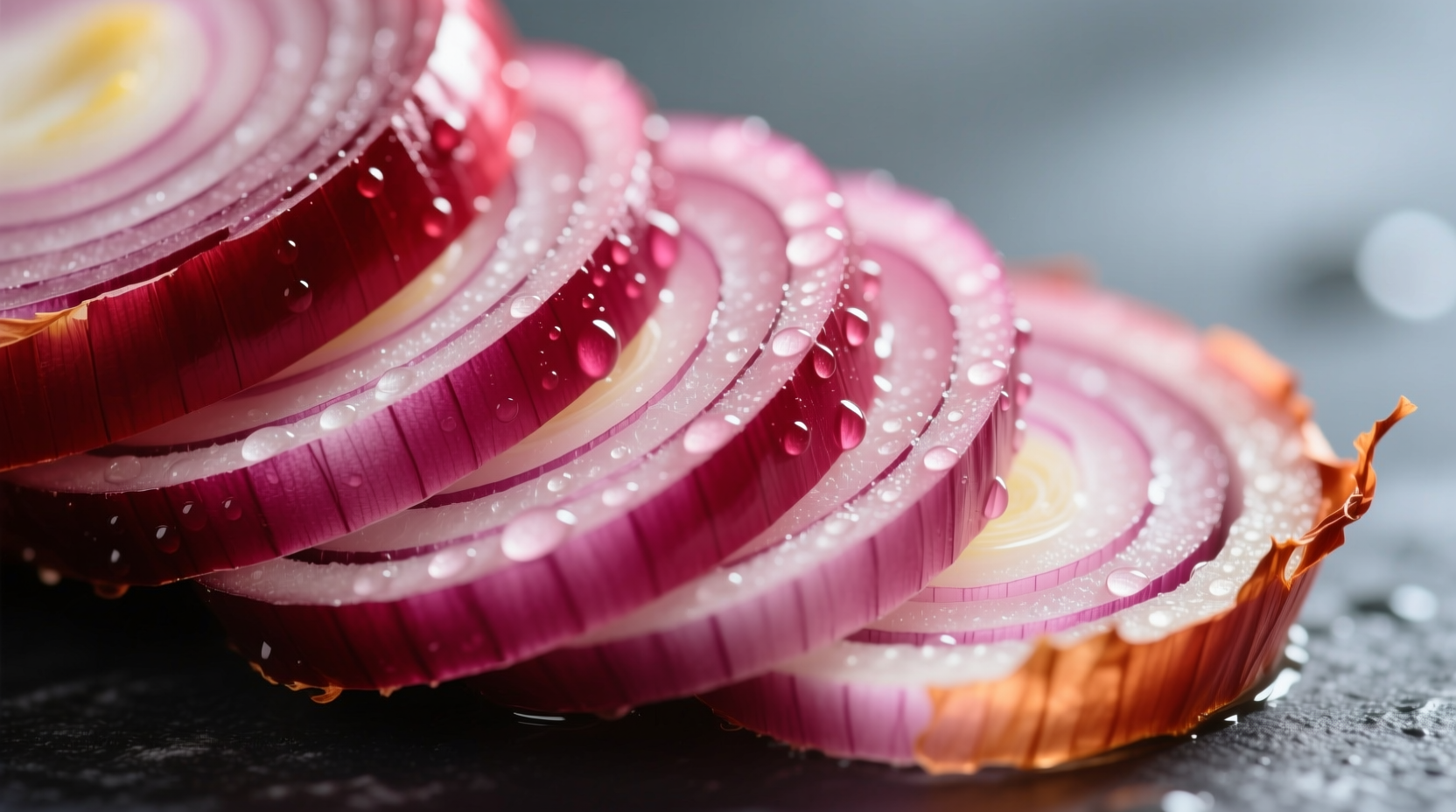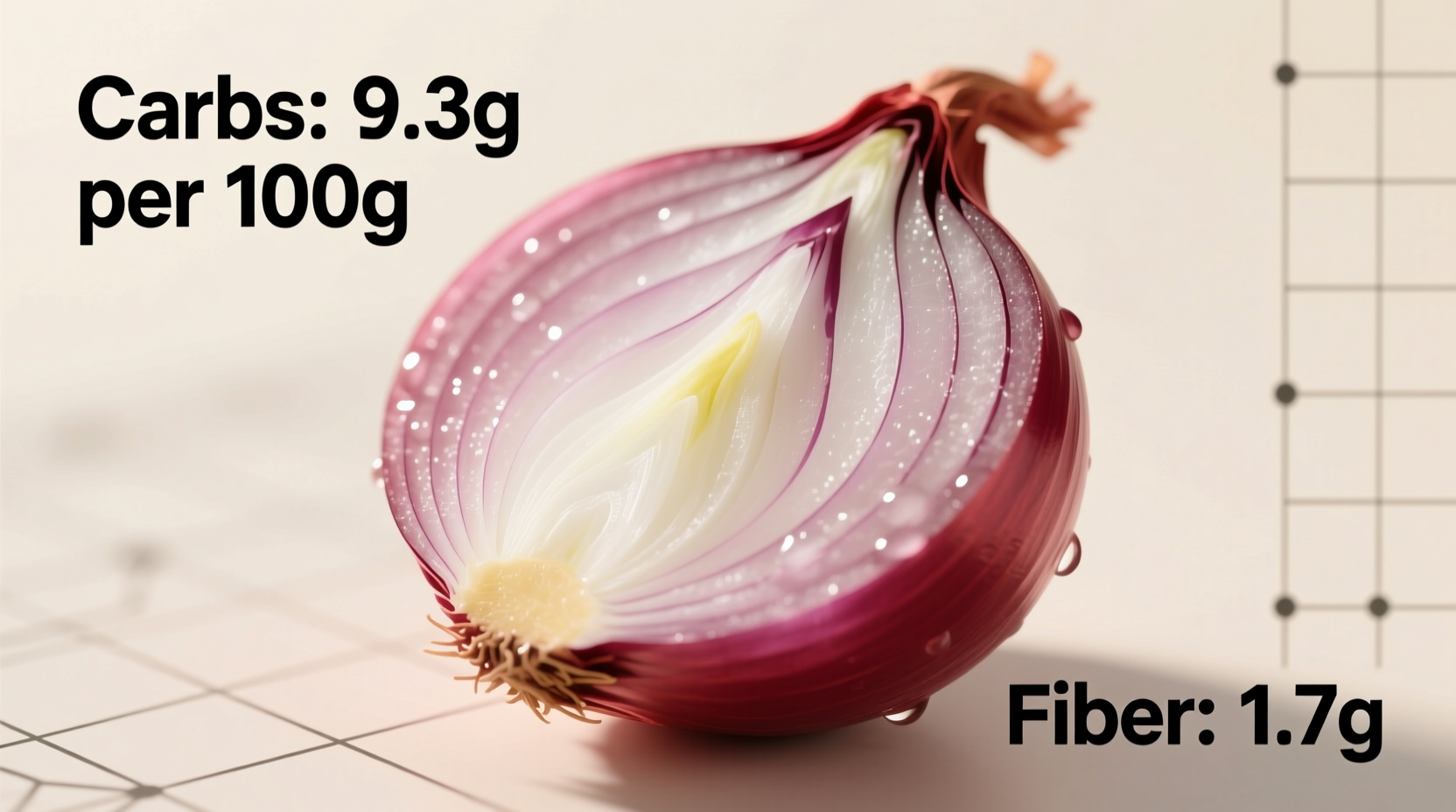Understanding the carbohydrate content in red onions is essential for anyone monitoring their dietary intake, whether for diabetes management, keto adherence, or general health awareness. Unlike many vegetables, onions contain natural sugars that contribute to their distinctive flavor profile while providing valuable nutrients.
Breaking Down Red Onion Carbohydrates
When examining the nutritional profile of red onions, it's important to distinguish between total carbohydrates and net carbohydrates. Net carbs (total carbs minus fiber) are what primarily affect blood sugar levels and matter most for low-carb dieters.
| Nutrient | Per 100g | Per Medium Onion (110g) |
|---|---|---|
| Total Carbohydrates | 9.0g | 9.9g |
| Dietary Fiber | 1.7g | 1.9g |
| Sugars | 4.2g | 4.6g |
| Net Carbs | 7.3g | 8.0g |
Data sourced from the USDA FoodData Central (Release 1.01.2024) provides the most current nutritional analysis for raw red onions. This official government database represents the gold standard for nutritional information in the United States.
Red Onion vs. Other Varieties: Carb Comparison
Not all onions are created equal when it comes to carbohydrate content. Red onions contain slightly more natural sugars than yellow onions but less than sweet varieties like Vidalia.
| Onion Type | Total Carbs (per 100g) | Net Carbs (per 100g) | Sweetness Level |
|---|---|---|---|
| Red Onion | 9.0g | 7.3g | Moderate |
| Yellow Onion | 9.3g | 7.6g | Moderate |
| White Onion | 8.6g | 7.0g | Mild |
| Sweet Onion | 10.5g | 8.8g | High |
| Green Onion | 7.3g | 5.8g | Low |
This comparison reveals why red onions often get overlooked in strict low-carb diets despite being nutritionally superior to many alternatives. The difference between red and white onions is minimal, while sweet onions contain significantly more carbohydrates.
Health Implications of Red Onion Carbohydrates
Despite containing natural sugars, red onions have a remarkably low glycemic index of approximately 10, making them suitable for most blood sugar management plans. The carbohydrates in red onions primarily consist of fructose and sucrose, which metabolize differently than refined sugars.

Research from the National Institutes of Health indicates that the quercetin abundant in red onion skins may actually improve insulin sensitivity. This creates a beneficial paradox where the natural sugars in red onions are partially counterbalanced by compounds that help regulate blood sugar.
Practical Usage for Different Dietary Needs
For those following specific dietary protocols, understanding how to incorporate red onions effectively makes all the difference:
Keto and Low-Carb Dieters
With approximately 8g net carbs per medium onion, red onions can fit within moderate low-carb diets (50-100g net carbs daily). For strict keto diets (under 20g net carbs), limit portions to 1-2 tablespoons raw or 3-4 tablespoons cooked.
Diabetes Management
The American Diabetes Association recognizes onions as a non-starchy vegetable with minimal impact on blood glucose when consumed in standard portions. The chromium content in red onions may actually help improve glucose tolerance.
Cooking Methods That Affect Carb Content
Contrary to popular belief, cooking doesn't significantly reduce carb content in onions. However, caramelization converts some natural sugars into more complex compounds, potentially lowering the glycemic impact. Roasting concentrates flavors while maintaining the same carb count per weight.
Maximizing Nutritional Benefits While Managing Carbs
Smart culinary techniques can help you enjoy red onions while keeping carb intake in check:
- Use raw red onions sparingly in salads (1-2 tablespoons)
- Pair with high-fiber vegetables to slow sugar absorption
- Choose pickled red onions for enhanced flavor with slightly reduced carb impact
- Substitute half red onion and half cucumber in salsas
- Store properly to maintain nutritional value (cool, dark place)
Professional chefs often employ the "onion foundation" technique—using a small amount of sautéed red onion as a flavor base before adding other vegetables—to maximize flavor impact while minimizing carb contribution.
Frequently Asked Questions
How many carbs are in a half cup of red onion?
A half cup (approximately 58g) of chopped raw red onion contains about 5.2g total carbohydrates and 4.2g net carbs. This makes it a reasonable addition to most balanced meals without significantly impacting daily carb goals.
Are red onions suitable for a keto diet?
Red onions can be included in a moderate keto approach when carefully portioned. A tablespoon (15g) of raw red onion contains approximately 1.4g net carbs, making it feasible for strict keto diets when used sparingly as a flavor enhancer rather than a primary ingredient.
Do red onions raise blood sugar significantly?
No, red onions have a very low glycemic index (approximately 10) and minimal impact on blood sugar when consumed in typical serving sizes. The chromium and quercetin compounds in red onions may actually improve insulin sensitivity according to research published in the Journal of Nutrition and Metabolism.
How does the carb content change when red onions are cooked?
Cooking doesn't significantly reduce the carb content of red onions by weight. However, cooking reduces their volume, so a cup of cooked onions contains more carbohydrates than a cup of raw onions. The natural sugars caramelize during cooking, which changes their chemical structure but not the total carbohydrate count.
Which onion has the lowest carb content?
Green onions (scallions) have the lowest carb content among common onion varieties, with approximately 7.3g total carbs and 5.8g net carbs per 100g. White onions follow closely with 8.6g total carbs and 7.0g net carbs per 100g, making them slightly better options than red onions for extremely low-carb diets.











 浙公网安备
33010002000092号
浙公网安备
33010002000092号 浙B2-20120091-4
浙B2-20120091-4